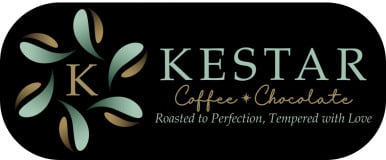Description
Processing: Yeast Inoculation (LALCAFÉ ORO), Washed; SCA Score: 86.5 pts
Flavor: Bold notes of raisins and dried fruit, cascara tea, watermelon, maple syrup sweetness, cashew nuts, lime-like acidity, and a medium, creamy body.
ROAST PROFILE: Suitable for Espresso and Filter preparation.
GRINDING: Whole beans (Standard Delivery).
DEGASSING PERIOD:
- Espresso: 10-14 days
- Filter: 7 days
To provide you with freshly roasted coffee, at KESTAR COFFEE, coffee is roasted only on order and is available as whole beans (standard) or ground, delivered in special packaging with a degassing valve.
If you wish to receive ground coffee, before finalizing your order, please mention in the "ORDER COMMENTS" section how you prefer it: for espresso, filter, Turkish coffee, etc.

Processing: Yeast Inoculation (LALCAFÉ ORO), Washed; SCA Score: 86.5 pts
Flavor: Bold notes of raisins and dried fruit, cascara tea, watermelon, maple syrup sweetness, cashew nuts, lime-like acidity, and a medium, creamy body.
Washing Station
Nemba is located in the northern province of Kayanza and is managed by an agronomist. This agronomist oversees the implementation of Good Agricultural Practices (GAP) and farmer education, working closely with producers to ensure they have access to essential agricultural tools and to help them determine and implement the best techniques suited to the specific growing conditions of their plots.
All 3,000 contributing producers are smallholders who each own, on average, 150 coffee trees. The farms delivering cherries to Nemba are all situated around 1,700 meters above sea level, near the Kibila forest. The station operates more than 200 drying tables and has the capacity to process up to 750 metric tons of coffee cherries annually.
The washing station is equipped with 10 fermentation tanks, 2 soaking tanks, and a drying field with 165 drying tables and 4 pre-drying tables. Kibingo can process 750,000 kg of cherries per day.
At the washing station, farmers have access to organic fertilizer made from composted coffee pulp. To promote farm renovation, producers can purchase subsidized coffee seedlings at reduced prices directly from the station, which maintains its own nursery for this purpose.
The washing station is involved in several farmer support and awareness projects, including a livestock-rearing program and a series of Farmer Hub initiatives focused on strengthening cooperatives and improving yields.
Cultivation
The majority of coffee trees grown in Burundi are Red Bourbon, selected for their superior quality. However, as coffee plots become increasingly smaller, aging rootstock presents a serious challenge. Many farmers have trees over 50 years old, and due to limited land, it's difficult to justify removing them from production during the 3–4 years required for new trees to begin yielding. To encourage renovation, Greenco purchases seeds from the Institut des Sciences Agronomiques du Burundi (ISABU), establishes nurseries, and sells seedlings to farmers at or below cost.
Despite the widespread coffee culture in Burundi, each smallholder farmer produces a relatively modest harvest. The average grower cultivates around 250 coffee trees, usually planted in their home gardens. Each tree yields approximately 1.5 kilograms of cherries, meaning the typical farmer sells about 200–300 kilograms of cherries per year.
Harvesting and Post-Harvest Process
During the harvest season, all coffee is handpicked. Since most families have only 200 to 250 trees, harvesting is done almost entirely by family members.
After sorting, cherries are pulped within 6 hours of delivery. During pulping, cherries are separated by density (high and low) using a Mackinon three-disk pulper equipped with an additional separation disk. Once pulped, the coffee is placed into epoxy-coated concrete fermentation tanks. Oro yeast, purchased from the French company Lalcafé, is added, and the tanks are left to ferment in this environment for around 36 hours.
LALCAFÉ ORO™ yeast (Saccharomyces cerevisiae) was specially developed over four years of research and trials for coffee production. Studies conducted in various regions and climates have shown that Oro is well-suited for improved control over the wet process and enhancement of cup quality. Oro’s ability to thrive even at low temperatures makes it adaptable to most altitudes. It also helps guard the fermentation process against spoilage caused by unwanted microorganisms. Moreover, its unique metabolism and high activity levels—even at temperatures as low as 15°C inside the coffee tank—allow for the expression of fresh, fruity characteristics while preserving the individuality of each coffee’s flavor profile.
The extended fermentation time for yeast-inoculated coffee (compared to the typical 12 hours for standard washed processing) also enables deeper flavor development. This extra time allows the beans to absorb metabolites that can enrich flavor complexity. Brightness, floral notes, acidity, and overall complexity are elevated through prolonged fermentation.
After fermentation, the coffee is channeled through washing and grading channels. These channels separate the beans into seven grades based on density. After washing, the parchment coffee is either spread on wooden trays or placed in nylon sacks and transferred to raised drying beds—each lot kept separate by quality group. Each tray or sack retains a traceability tag with all identifying information.
The parchment dries on raised beds for 2–3 weeks. During this stage, it’s repeatedly sorted and sifted to ensure even drying. Drying takes place from sunrise to sunset, with the coffee covered at night or during rain.
Once dried, the parchment coffee is packed and transported to the warehouse. The Greenco team of expert cuppers evaluates each lot—separated by washing station, processing day, and quality level—in the lab. Traceability of the station, date, and quality is maintained throughout the entire process.











